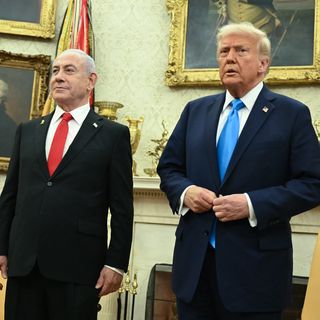Reading view
Report: Lakers Have Discussed Trades for 3 Centers
Woman Not Prepared for Lengths Boyfriend Goes to Whenever She Tries to End Relationship
Report: Warriors Showing Interest in Damian Lillard
Giants Top Prospect Floated As Potential 'Panic Button' Trade Candidate
How to Watch Borussia Dortmund vs Monterrey: Live Stream FIFA Club World Cup Round of 16, TV Channel
Ohio State Buckeyes' Jeremiah Smith Doesn't Hold Back About Julian Sayin
Marjorie Taylor Greene's Boyfriend Reacts To Trump Asking About Dating Her
Trump says Israel has agreed to terms for 60-day Gaza ceasefire
President Trump announced Tuesday that Israel has agreed to an updated proposal for a 60-day ceasefire in Gaza that would secure the release of some hostages.
- He urged Hamas to accept the deal, warning on Truth Social that "it will not get better — IT WILL ONLY GET WORSE."
Why it matters: Fresh off brokering a ceasefire between Israel and Iran after 12 days of war, Trump is now pressing for a breakthrough in Gaza, where the conflict has dragged on for more than a year and a half.
- The 60-day ceasefire, which has been under negotiations for months, would mark a significant step in this direction.
- There's no indication yet that Hamas is prepared to accept the terms of the deal.
Driving the news: Trump's announcement followed several hours of meetings Tuesday at the White House between his envoy Steve Witkoff and Israeli Minister for Strategic Affairs Ron Dermer, a top adviser to Prime Minister Benjamin Netanyahu.
- The two discussed an updated ceasefire and hostage-release proposal put forward by Qatar.
- Dermer informed Witkoff that Israel accepts the Qatari proposal and is prepared to begin indirect talks with Hamas to finalize the deal, a senior Israeli official told Axios.
What they're saying: "Israel has agreed to the necessary conditions to finalize the 60 Day CEASEFIRE, during which time we will work with all parties to end the War," Trump wrote on Truth Social.
- He said Qatar and Egypt, which have been mediating between the two parties, would deliver this "final proposal" to Hamas.
- "I hope, for the good of the Middle East, that Hamas takes this Deal, because it will not get better — IT WILL ONLY GET WORSE," the president warned.
Yes, but: It remains unclear whether the latest proposal addresses the core sticking point in the talks: Hamas' demand for a firm U.S. commitment that a 60-day ceasefire will lead to a permanent end to the war.
- In previous rounds, proposals were coordinated in advance by the U.S., Qatar, and Israel, but ultimately fell short of Hamas' expectations.
Behind the scenes: "We came with ideas, and our objective today was to get Israelis to agree. And they did," a U.S. official told Axios.
Zoom in: The draft agreement envisions Israel and Hamas using the 60-day ceasefire to negotiate both a permanent end to the war and a road map for governing post-war Gaza.
- For Israel, any long-term ceasefire must include the removal of Hamas from power, the dismantling of its military wing and the exile of its senior commanders.
- Israel wants Gaza to be administered by local Palestinian officials unaffiliated with either Hamas or the Palestinian Authority — with Arab states like Egypt, Jordan, the UAE and Saudi Arabia playing active roles.
What to watch: Israel on Monday ordered civilians in additional areas of Gaza City to evacuate south, signaling preparations for a potential expansion of the IDF's ground offensive.
- Israeli officials warn that if negotiations on the ceasefire and hostage deal don't advance soon, the military will escalate its operations.
- "We'll do to Gaza City and the central camps what we did to Rafah. Everything will turn to dust," a senior Israeli official told Axios. "It's not our preferred option, but if there's no movement toward a hostage deal, we won't have any other choice."


Cardinals Outfielder Nearing Return Following Injured List Stint With Appendicitis
Orioles Utility Man Reportedly Out 8-12 Weeks With Hamstring Strain
Braves Gain Offseason Signing Back Wednesday Following PED Suspension
Eating Vegetables Might Permanently Damage Your Teeth
Jerry Bruckheimer Confirms NASCAR-Based Movie Sequel With Tom Cruise
Saquon Barkely Reveals Why Eagles Wanted Revenge vs Commanders
Donald Trump Says Israel Agrees to 60-Day Gaza Ceasefire
New NOAA document spells out further deep Trump cuts
A new NOAA document sheds further light on the Trump administration's proposed cuts and changes for the weather and climate agency.
Why it matters: The proposed budget would gut federal climate research efforts and spending at a critical moment in the fight to understand and address human-driven climate change.
Driving the news: Most notably, the proposal would eliminate NOAA's Office of Oceanic and Atmospheric Research (OAR), which performs and coordinates climate research.
- Some of OAR's functions would be transferred to the National Weather Service, but others would be cancelled.
"The FY 2026 budget eliminates all funding for climate, weather, and ocean Laboratories and Cooperative Institutes," reads the document.
- "It also does not fund Regional Climate Data and Information, Climate Competitive Research, the National Sea Grant College Program, Sea Grant Aquaculture Research, or the National Oceanographic Partnership Program."
Zoom in: NOAA would also "no longer support climate research grants," the proposal adds.
- What they're saying: "With that statement, the administration signals its intent to have NOAA, arguably the world's leading oceanic and atmospheric governmental organization, completely abandon climate science," writes meteorologist and former NOAA official Alan Gerard.
The big picture: The new details come amid broader Trump administration efforts to slash federal spending on climate research, renewable energy subsidies, electric cars and other fields and technologies widely seen as necessary to our understanding of — and adaptation to — climate change.
- The budget would also shutter Hawai'i's Mauna Loa laboratory, CNN notes, where decades of atmospheric CO2 measurements have shown evidence of anthropogenic climate change.
NOAA referred questions to the White House, which didn't immediately respond to a request for comment.
What's next: The proposal is subject to congressional tweaks and approval.
- While Republicans control both chambers, some recent controversial measures — like an attempt to make vast amounts of federal land available for sale — have failed amid bipartisan pushback.

